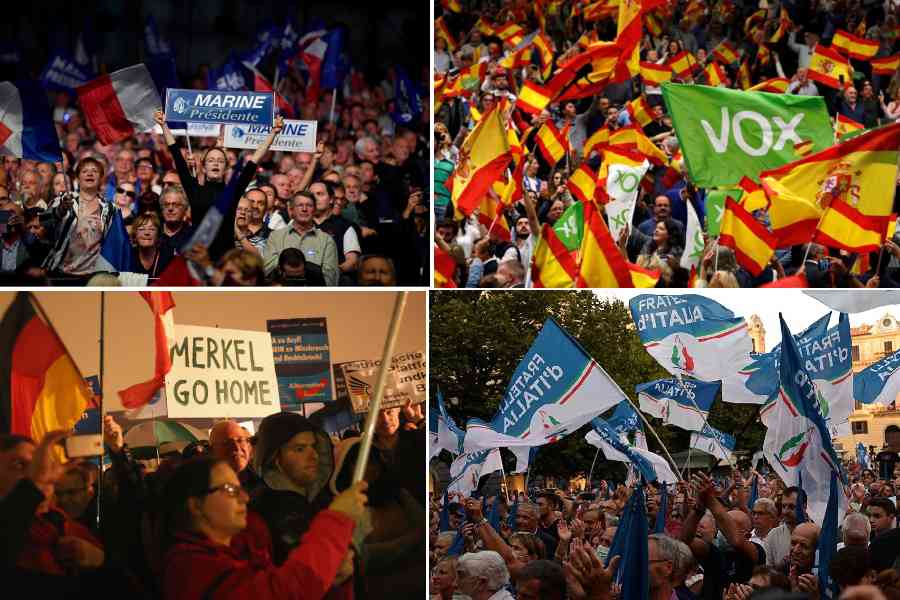Democracy is a very broad tent, embracing diverse shades of political opinion. After World War ll, Social Democracy was in vogue and first-generation politicians in the Indian subcontinent shared that vision. In Europe, among the heyday stalwarts were the British prime minister, Clement Attlee, President Francois Mitterrand of France and the German chancellor, Willy Brandt. Nowadays, Social Democrats exist in name and nowhere in deed. In Europe, as in other parts of the world, from East Asia to Africa, Japan to Nigeria, the ballot box has enabled the Right to rise, with its stress on free market economics, mercantilism, restrictions on immigration, financial policies to benefit the rich and the super-rich, and the ascendency of monopolistic oligarchs.
While in parts of the world right-wing politics is closely associated with the cult of the Supreme Leader, the situation in democratic Europe is more nuanced. Old taboos dating to Europe’s war against fascist Germany and Italy and the consequent revulsion against the extreme Right have been eroded and mainstream political parties no longer refuse to collaborate with far-Right groupings. Meanwhile, far-Right parties of various hues — nostalgic nationalist, populist nationalist, ultra-conservative with neo-fascist roots and others — are showing a strong revival.
Europe’s rise of the far-Right can be attributed to dissatisfaction with the political mainstream and the apprehension of an uncertain future. Many in Europe are attracted by the straight-speaking of the far-Right and there is frustration that traditional politicians have no answers to issues linked to identity, fear of open borders, and an erosion of traditional values, or, in economics, the rejection of globalisation and the fears for social justice. Overall, the feeling exists that present governments can no longer be entrusted with the future destination.
Besides the protest vote against established parties, this situation indicates polarisation between urban liberals and the conservative Right. There have been ultra-conservative, authoritarian-leaning governments in Hungary since 2010 and in Poland since 2015, despite various manifestations of displeasure from the European Union at Brussels. There was anxiety in European Establishment circles at the rise of Jörg Haider’s Freedom Party in Austria in 2000 which evoked strong reactions and prompted the journalist, Peter Schwarz, to write, “In Austria, European governments see a mirror of their own future. Social tensions are rising.” But today, there wouldbe little more than a shrug of resignation at the news of the far-Right’s success.
In Germany, hyper-sensitive about its Hitlerite, fascist past, opinion polls place the far-Right Alternative for Germany ahead of, or on a par with, the Social Democrats of Chancellor Olaf Scholz. Where the political Right has long been a pariah, economic uncertainties and the surge of asylum-seekers from Ukraine have helped the AfD to be a front-runner in former East German provinces. It is gaining popularity even in richer West Germany.
While the French president, Emmanuel Macron, struggles to control the widespread riots after the killing of an Algerian immigrant, his political adversary, Marine Le Pen, of the far-Right National Rally, with a tough, security-based, anti-immigration message, is benefitting in the polls. Europe’s third-largest economy, Italy, is run by Premier Giorgia Meloni, head of Brothers of Italy, a party with neo-fascist roots.
In Spain, the nationalist Vox party, led by Santiago Abascal, exceeded expectations in the recent regional elections. Abascal is agreeable to Vox forming a coalition with the conservatives after national elections this month. If that happens and the Spanish Socialist Workers’ Party of Prime Minister Pedro Sánchez is defeated, this would be the first far-Right party in Spain’s government since the death of the fascist dictator, Francisco Franco, in 1975. Thisindicates the trend of hard-Right parties surging in the polls and being willing to enter government as junior partners. The argument of the coalition majority is that the far-Right is too strong to be ignored and thebest way to moderate it would be to induct it into government responsibility.
Sweden’s ruling right-wing coalition depends on support from the anti-immigrant, anti-multicultural Sweden Democrats, a party with Nazi roots and the second-largest formation in Parliament. In Finland, after three months of negotiations, the ultra-nationalist Finns Party is in the governing coalition. In Greece, three hard-Right parties won enough seats this month to enter Parliament, while in the Netherlands, the centre-Right prime minister, Mark Rutte, resigned after failing to outflank the Opposition hard-Rightists through tougher immigration legislation, providing an example of a mainstream politician obliged to adopt policies from the far-Right hoping to deprive it of its core support. But doing so makes the far-Right more acceptably mainstream. At the same time, a number of far-Right parties in Europe have deliberately moved towards the politicalcentre in the hope of widening their base.
Relations between far-Right parties and the European Union are undergoing transformation. After the Brexit vote in 2016 in the United Kingdom, the EU feared that France, Denmark, Italy and perhaps others might leave the union. Many European countries have deeply Eurosceptic populist parties that are doing well. But over the years, these parties have stopped advocating leaving the EU or even the Euro currency. Observing the negative social, political and economic impact of Brexit, they conclude that leaving the EU would cause additional destabilisation in an already volatile environment. Therefore, the EU is more broadly acceptable among Europeans than it has been for years and right-wing parties speak of reforming it rather than abandoning it. These parties are expected to perform strongly in next year’s elections for the European Parliament.
The European far-Right does not share identical policies; the common denominator is that they fear the effects of globalisation and the loss of national identity due to immigration and a strong EU. They wish to introduce more protectionism and some are sceptical of climate-change policies, NATO and the arming of Ukraine. A large number of parties of the far-Right, like Lega in Italy, the National Rally of France and Austria’s Freedom Party, have historic ties with Moscow which became awkward following Russia’s invasion of Ukraine, leading to party leaders amending their rhetoric.
Far-Right policies impact the debate on green energy. In the Netherlands this year, the right-wing, populist Farmer-Citizen Movement won the largest number of seats in Parliament’s upper House. In Germany, public concern about finances restrains the Green Party, which is part of the government coalition, from introducing the reforms it promised.
While the Asian-African ‘Infallible Chieftain’ aspect of politics is largely absent in European democracy, far-Right politics is, nevertheless, thriving and is set to consolidate its position over the next few years to become the new normal. In that respect, the political scenario in most of the world will display considerable uniformity. Whether this will make the world a safer and more harmonious place remains an open question.
Krishnan Srinivasan is a former foreign secretary










